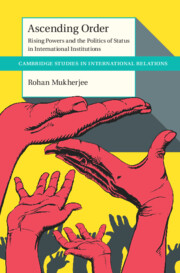Book contents
- Reviews
- Ascending Order
- Cambridge Studies in International Relations: 160
- Ascending Order
- Copyright page
- Dedication
- Epigraph
- Contents
- Figures
- Tables
- Acknowledgments
- Abbreviations
- 1 Introduction
- 2 Conceptual Foundations
- 3 Institutional Status Theory
- 4 The United States and the Atlantic System in the Nineteenth Century
- 5 Japan and the Washington System in the Interwar Period
- 6 India and the International Order of the Cold War
- 7 China and the Liberal International Order
- 8 Conclusion
- Appendix Case Selection
- Index
- Cambridge Studies in International Relations
7 - China and the Liberal International Order
Published online by Cambridge University Press: 21 July 2022
- Reviews
- Ascending Order
- Cambridge Studies in International Relations: 160
- Ascending Order
- Copyright page
- Dedication
- Epigraph
- Contents
- Figures
- Tables
- Acknowledgments
- Abbreviations
- 1 Introduction
- 2 Conceptual Foundations
- 3 Institutional Status Theory
- 4 The United States and the Atlantic System in the Nineteenth Century
- 5 Japan and the Washington System in the Interwar Period
- 6 India and the International Order of the Cold War
- 7 China and the Liberal International Order
- 8 Conclusion
- Appendix Case Selection
- Index
- Cambridge Studies in International Relations
Summary
This chapter offers a plausibility probe of IST in the case of China and the contemporary liberal international order. The LIO – a multifaceted set of institutions covering a range of security and non-security issues – has contributed immensely to China’s economic growth, diplomatic influence, and national security. China, nonetheless, opposes some and embraces other parts of the international order. The chapter shows that existing theories of revisionism struggle to explain this pattern of cooperation and discord in China’s approach. It then traces China’s status aspirations in the post-Cold War period and applies IST’s predictions to China’s stances in various prominent international institutions. The chapter concludes that IST can broadly apply in this case across institutions and issue areas, though further research is required to decisively demonstrate this claim.
Keywords
- Type
- Chapter
- Information
- Ascending OrderRising Powers and the Politics of Status in International Institutions, pp. 246 - 280Publisher: Cambridge University PressPrint publication year: 2022



